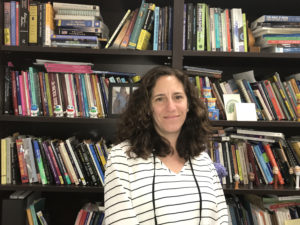In addition to being a professor in the English Department who teaches Professional Writing and Rhetoric classes, Dr. Paula Rosinski is the Director of Writing Across the University in the Center for Writing Excellence. Dr. Rosinski explains that the Professional Writing and Rhetoric major is a “traditional rhetorical education, updated for the 21stcentury” and that the WAU program supports the teaching and learning of writing on Elon’s campus.
Dr. Rosinski specializes in multimedia rhetoric and writing technologies. She said that “in the writing technologies class I teach, we examine the biases, affordances, and limitations of different writing software and technologies that are common to professional writers, because they impact everything about the rhetorical situation: the audiences you can reach, the genres you can produce, and how texts are delivered and consumed.
This semester, she is teaching PWR 212, Multimedia/Visual Rhetoric I, in which students revise traditional rhetorical strategies and apply them to produce their own multimedia and visual texts. These two classes go hand-in-hand, because “To be able to produce emerging genres and multimedia and visual texts, you need to have an understanding of the software and hardware. Analyzing isn’t enough. Students should practice how to produce these kinds of texts, too.”
Dr. Rosinski’s role as Director of Writing Across the University involves developing programming to enhance the teaching of writing on campus, for example by offering workshops herself or inviting faculty to present on their own areas of expertise. Dr. Rosinski also coordinates writing pedagogy grants and scholarship grants, meant to support faculty as they teach and study writing, and she also organizes writing groups and writing “boot camps” for faculty and staff, which give them time to focus on their own writing. “What’s rewarding is that the work I do with faculty directly impacts students,” Dr. Rosinski said, “I hear back from faculty saying not only did they learn to teach writing more effectively, but that their students are learning content better too.”
Dr. Rosinski was involved with leading Elon’s Writing Excellence Initiative, which was a recently concluded 5-year project designed to enhance writing in the disciplines and professions, writing as a citizen, and writing to learn, across all majors, select Student Life units, and the CORE curriculum. As a result of the WEI, the majors, Student Life, and the CORE wrote a total of 144 new Writing Outcomes which are integrated across all four years of the curriculum. As a part of the WEI assessment, Dr. Rosinski and Dr. Heather Lindenman also conduct a study of students’ non-academic writing and the ways in which it relates to their nonacademic writing, as well as a survey about the professional writing lives of about one thousand Elon alumni.
In their soon-to-be-published article, “Writing Outside of Class: The Untapped Potential of Students’ Non-Academic Writing,” Dr. Rosinski and Dr. Lindenman analyze the results from their online survey from last spring, which received 138 responses. “We found that non-academic writing [among students] is alive and well and that this kind of writing has implications for their academic writing, too,” Dr. Rosinski said.
For a previous study, Dr. Rosinski had her students talk about their online writing, such as Facebook posts, text messages, and Twitter exchanges. “What I found in that earlier study was that students were very rhetorically smart in that non-academic writing, but they didn’t necessarily make connections and apply what they had learned to their academic writing,” she said. This conclusion motivated her later study with Dr. Lindenman because they wanted to examine further how the non-academic writing of students may impact their academic writing.
Dr. Rosinski indicated that she was pleased with the success of the five-year Writing Excellence Initiative. “We had discussions across the university about how people write in their personal, professional, academic and civic lives and about how writing is discipline and context-specific,” she said, “This means that it’s important for writing to be taught across the disciplines.”

